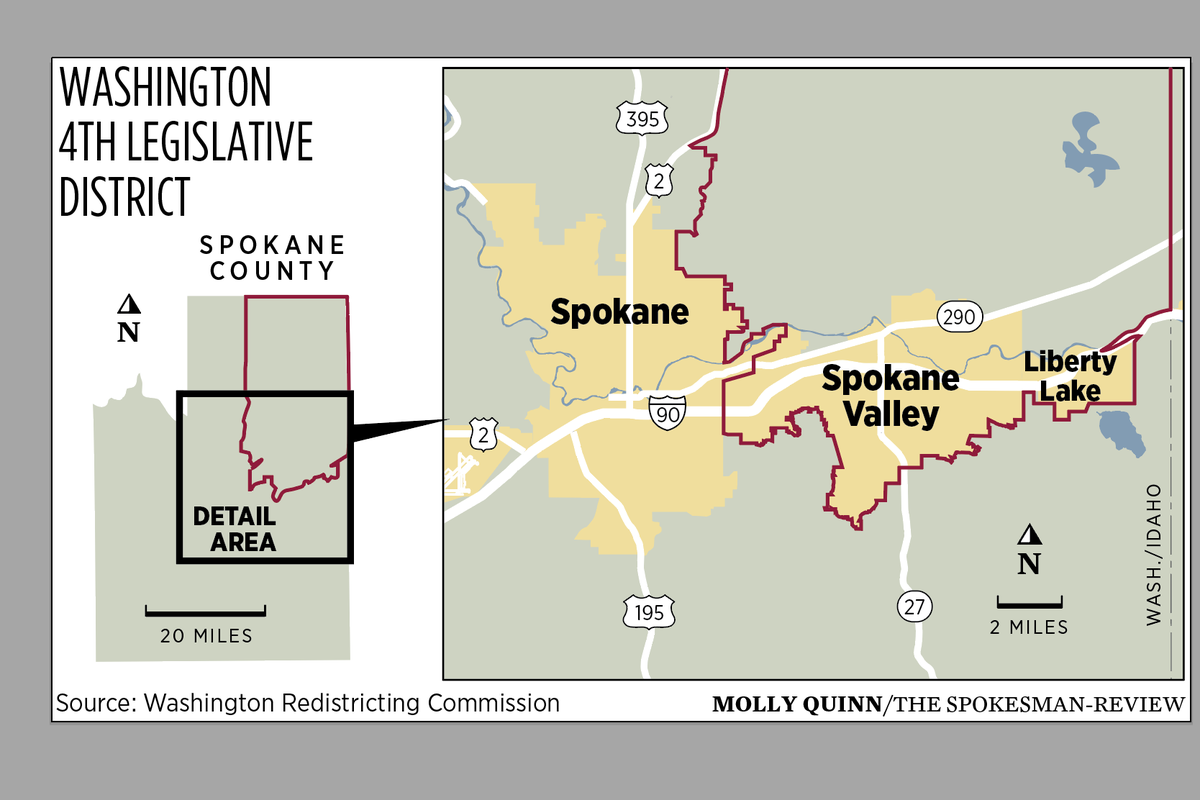Software engineer, rage room owner challenge Rep. Suzanne Schmidt for Spokane Valley House seat
Schmidt (Photos contributed by the candidates)
A software engineer with a hot sauce company and the owner of a rage room are vying to replace Rep. Suzanne Schmidt in the state Legislature.
The race is for Position 1 in the 4th District, which stretches from Spokane Valley in the south, Elk to the North, and from the Idaho stateline to Newport Highway. The district has only elected Republicans since 1994.
Schmidt, a Republican, was elected to the position in 2022 as a political newcomer, beating out fellow Republican MJ Bolt, who later became chair of the Spokane County Republican Party, and Ted Cummings, a Democrat who spent decades working for Kaiser Aluminum.
To retain her seat, Schmidt will need to fend off challenges from Kris Pockell, a software engineering manager who filed as an independent candidate, and Green Party candidate Kitten Wildes Beeler, who owns and operates Rage Xscape on Division Street. Pockell also co-owns Elixir Sauce Co., a hot sauce production company that sells its products online and at local farmers markets.
The race has the fewest candidates in the district, with the other House seat and the state Senate seat drawing a half-dozen contenders each. The top two candidates in the Aug. 6 primary for each race will face off in the November election.
Schmidt, 60, has the fundraising advantage, raising nearly $49,000, according to state Public Disclosure Commission filings. Pockell and Wildes Beeler had not reported any contributions as of Friday afternoon.
Why they’re running
Schmidt said retaining her seat would allow her to continue with the work she’s already begun, now having more knowledge of how to navigate Olympia and more relationships with legislators across the state and across the political spectrum.
“I’m just really fired up about going, you know, for two more years and being able to just expand on that, to get more things done and get some more legislation through the Legislature,” Schmidt said. “Then also, when there’s bad legislation, being very strategic in stopping that legislation and working to keep it from becoming law.”
Schmidt pointed to two bills she sponsored that became state law as an example of that work: one that increased incentives for injured workers to return to work, and another aimed at streamlining the process related to unemployment insurance benefit charging. Both measures received unanimous support in the House on their way to the governor’s desk for a signature.
This will be Pockell’s second attempt at a public office, after he unsuccessfully ran for a seat on the Spokane Valley Fire Department commission in 2015. He said that campaign helped him prepare to run for a bigger office, and he has bided his time looking for another opportunity for public service. He decided to run because he said he cares deeply about Eastern Washington, where he grew up.
“We need people who care about this place and really want to see it improve,” Pockell said. “I felt like other people may be able to accomplish those things, but I’ve always been of the mindset that if you want to affect change and make things better, the best way to do that, really, is to try and do it yourself.”
Pockell, 37, added that at the time he filed, Schmidt was running unopposed, which he feels goes against the principles of democracy. He listed himself as an independent because he does not want to be beholden to party politics, and believes he and many others are tired of the divisiveness of partisan politics.
“I don’t want to have to toe a party line or vote in a certain way just because the party thinks that’s the right way to vote,” Pockell said. “I want to be free to vote in the way that I think is going to be best for the people of Eastern Washington.”
Wildes Beeler, 41, said she was motivated to make her first foray into politics after spending years hearing her customers share their frustrations and stress over rising costs of living, tax increases and a general sense that their elected leaders were not working hard enough to improve the lives of their constituents.
“A lot of people like to sit down and talk to us about how their life is going,” Wildes Beeler said. “For the last three years, everyone’s starting to feel the same, no matter who they are, what they believe, they’re all starting to feel the struggle.”
Wildes Beeler said the Green Party’s general approach of putting human beings first, and finding common ground with others to find solutions, is what attracted her to the party.
“It’s ‘How do we make sure that everyone has, in a nonviolent way, in a community-based, loving way, everyone has what they need?’ ” Wildes Beeler said of the Green Party’s approach. “That we’re not sitting there giving judgment, that we’re actually curious about how we can grow and help others.”
On the issues
All three candidates said reducing costs of living in the state is one of their top priorities. Schmidt and Wildes Beeler criticized the Climate Commitment Act, which many have blamed for higher gas prices and could be repealed in November through Initiative 2117. Pockell’s said one of his goals is to ensure housing becomes more affordable for working families.
“For people of my generation and younger, the American dream of homeownership is starting to slip out of reach for a lot of those people,” Pockell said.
Wildes Beeler has called for a statewide cap on rent, cost-of-living adjustment checks “for every American” and keeping all taxes from the sale of cannabis in the county in which it was collected, to use it for road projects and public education. Ending homelessness by establishing a statewide transitional housing program would be another top priority as she formerly was homeless, Wildes Beeler said.
Schmidt said homeowners are being “taxed out,” and the way in which the state and local governments fund different ventures needs to be re-evaluated. Property taxes and sales taxes are becoming burdensome, she said.
“People need relief,” Schmidt said. “What did I say I was running on in the first place? I wanted to ensure safe neighborhoods and to give relief to working families, and those are still top of my list.”
Regarding public safety, Schmidt said recent legislation has made it easier for people to commit crimes without facing much consequence. She would like to see more stringent punishments and would work toward repealing some of the police reform bills in recent years to “restore some of the tools to our law enforcement officers.”
Pockell echoed Schmidt’s sentiment that there is a general feeling of a lack of safety nowadays, and said more resources could be provided to law enforcement officers to assist them in their policing efforts. He added that mental health can fall under the public safety umbrella as well, and is supportive of co-response programs that help those in crisis receive treatment.
If elected, Wildes Beeler would advocate for more police reform, saying in her campaign materials that police misconduct is a real issue. She points to the seven incidents so far this year in which law enforcement officers in Spokane County have shot a suspect.
Wildes Beeler said she also would like to reform how the state Legislature operates. She said there is a lack of transparency, and legislators are not working as hard as they should be.
She thinks legislative sessions in which lawmakers propose, consider and pass bills are too short, and have led to a backlog of policies sitting in committee. The legislative cycle in Washington is two years, alternating between 105-day sessions in odd-numbered years and 60-day sessions in even-numbered years.
“It’s time to make the playing field level,” Wildes Beeler said. “It’s time to make Congress work like us, for us, and reorganizing how they operate.”
Wildes Beeler said she’d also advocate for term and age limits, stricter requirements to serve in public office, salary decreases for elected leaders, banishing lobbying in Olympia and instituting ranked-choice voting statewide.
On education, Pockell said a lot of work still needs to be done to help Washington students get back up to speed after the COVID-19 pandemic, whether it be improving their social skills or in their studies.
Pockell said he is disappointed local schools have become a battleground for larger cultural discourse, as many do not run into the issues being discussed at a national level. He would like to see more civility between those with differing views not only on education, but in every other aspect of life.
“There’s a real strong sense of demonization from both sides of the aisle, where it’s like, ‘These guys are trying to destroy this country,’ ” Pockell said. “And I don’t think that that’s true. I think that everybody, whether they are a politician or just everyday people, we all kind of want the same thing. We want what’s best for us, we want what’s best for our families, and then we want what’s best for our communities.”
Wildes Beeler said community colleges in Washington should be free to attend, and she would like to institute a voucher program to help low-income families attend private schools.
Economic development and supporting small businesses is a big tenet of Schmidt’s campaign. She said she is working to institute more alternatives for individuals interested in entering the trades, or computer sciences, as well as making sure the region remains an attractive place for businesses.
“These are the things that I started out working on, and I have gained that experience and knowledge and created those relationships that make it possible for me to move that legislation,” Schmidt said.




